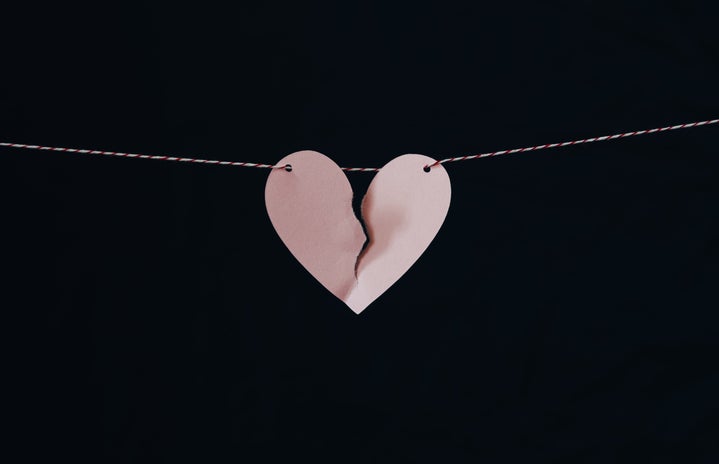It’s no secret that there has been a pattern in modern dating culture. It seems as if it’s more common to be in a “talking stage” that fizzles out instead of blooming into an actual relationship. I’ve been there more times than I’d like to admit, and I know how it feels to be caught in that limbo of uncertainty. Navigating the complexities of modern dating can leave you feeling confused and vulnerable. You might find yourself replaying conversations, analyzing texts for hidden meanings, and wondering if the other person feels the same way you do. It’s exhausting and often disheartening, especially when you invest so much of yourself without any assurance of a solid commitment. Over the past year or two, I’ve developed a few ways to finally get over that failed situationship. Although it may be tricky, it will help you finally discover that you are capable and deserving of love.
Cut contact… NOW!
Although this seems like a no-brainer, it is the hardest step in the entire process, especially if you’re on good terms. Cutting them out of your life is the hardest, but best thing you can do for yourself. Keeping them around only makes you want them more and makes them feel like they always have access to you. Cutting them off breaks that tie. They no longer have the power – you do.
Once you cut contact, do not go back. In my experience, when you go back, you immediately become the person who hurts more in the situation. While you give the situation attention, their ego continues to build, giving them the power to hurt you even worse than before. It’s a cycle that can be tough to break, especially when the emotional pull is strong.
It will hurt at first, but it is so worth it in the end. You’ll experience a whirlwind of emotions – sadness, anger, and even moments of doubt about your decision. This is normal. Allow yourself to feel these things without judgment. Remember, though, that every time you resist the urge to reach out, you’re reclaiming a piece of your power.
Mourn the loss. It was real to you.
Although it didn’t work out the way it was supposed to, the relationship still held significance. Whether it was a relationship, talking stage, or simply a crush, your feelings were genuine and valid even if they weren’t reciprocated. The emotions you experienced – the flutter of excitement when you saw a message pop up, the anticipation of their response, and the daydreams that filled your mind – are all meaningful, regardless of the outcome. These feelings are a testament to your capacity for connection and vulnerability.
It’s completely natural to feel a sense of loss when something you invested in comes to an end, no matter how brief or seemingly inconsequential. You might think it’s silly to feel this way, but it’s essential to acknowledge that sadness. It’s part of the process of understanding what you felt and what it meant to you. Emotions don’t exist in a vacuum; they reflect your hopes, desires, and the moments you cherished, however fleeting they may have been.
Allow yourself the space to truly reflect on those good moments. Think about the laughter you shared, the inside jokes that made you smile, or the fleeting glances that made your heart race. Each of these experiences contributed to your emotional landscape, shaping your understanding of intimacy and connection. Reflecting on the positive aspects can help you appreciate the journey, even if it didn’t lead to the destination you envisioned.
It’s okay to grieve the loss of a potential connection, even if it was brief. This process of acknowledgment is not only healing but also essential for your growth. By honoring your feelings, you pave the way for greater emotional awareness and readiness for what comes next. Each experience shapes you, preparing you for the right connections that will resonate with your authentic self in the future.
Reflect on it
Take a moment to reflect on the entire situation, allowing yourself to explore the depths of your feelings and experiences. Start by analyzing why you liked this person in the first place. Was it their charming personality, shared interests, or the way they made you feel? Consider the specific moments that stood out to you – did they make you laugh, engage you in thought-provoking conversations, or support you during difficult times? Identifying these positive traits can help you understand what you value in relationships.
Next, take some time to reflect on what you disliked about them. Were they unreliable, overly critical, or had communication habits that frustrated you? Recognizing these elements about them can not only make it easier to get over them, but can also help you avoid repeating patterns that don’t serve you in future relationships.
Reflect on what you could’ve done better in this situation. This step isn’t about blaming yourself, it’s more for personal growth. Could you have communicated your feelings more clearly, approached situations with more empathy, or managed your expectations? Reflecting on your behaviors can help you to become a more effective partner.
Finally, take everything you have learned from this situation into consideration. This is the time to clarify what you truly want in a relationship. Even though this specific attraction didn’t work out, it provided you with insights that can guide your future choices. Understanding what initially attracted you to them and what led to your disconnect can help refine your intentions, allowing you to attract the right kind of people.
Know your worth
This step was one I grappled with for months, a relentless cycle of doubt and self-reflection. I found myself consumed by thoughts of what I might have done wrong and why things didn’t pan out the way I had hoped. Was I not pretty enough? Did I lack the qualities that would make me interesting or engaging? These questions played on repeat in my mind, leaving me feeling lost and insecure.
Each time I replayed our interactions, I scrutinized every word and gesture, trying to pinpoint the moment it all unraveled. I kicked myself for not being more engaging, for not showing my true self in the way I thought would impress him. I felt as if I was standing outside a window, peering in at a life that seemed just out of reach. The weight of my self-doubt was heavy, and I started to believe I would never be good enough for someone to truly love.
I now know that I am worthy of love because I am full of it. This realization was transformative, reshaping how I view myself and my relationships. It all starts from within you; understanding that love is not something I have to earn or seek from others, but rather a force that radiates from my own being.
Taking the time to reconnect with yourself often brings you to the conclusion that you deserve better. In the wake of disappointment and confusion, it’s easy to get lost in self-doubt and negative thoughts. However, stepping back to reflect allows you to rediscover your identity and values, helping you understand that the end of this stage doesn’t define your worth.
In navigating the aftermath of a failed talking stage, each step – cutting contact, mourning the loss, reflecting on the experience, and ultimately knowing your worth – plays a crucial role in your healing process. While it’s natural to feel a mix of emotions, embracing this journey allows you to grow stronger and more self-aware. As you move forward, remember that every ending paves the way for new beginnings. Trust that the lessons learned will guide you toward healthier connections that honor your true self. You are deserving of love and respect, and with each step you take, you’re one step closer to the relationship you seek.


